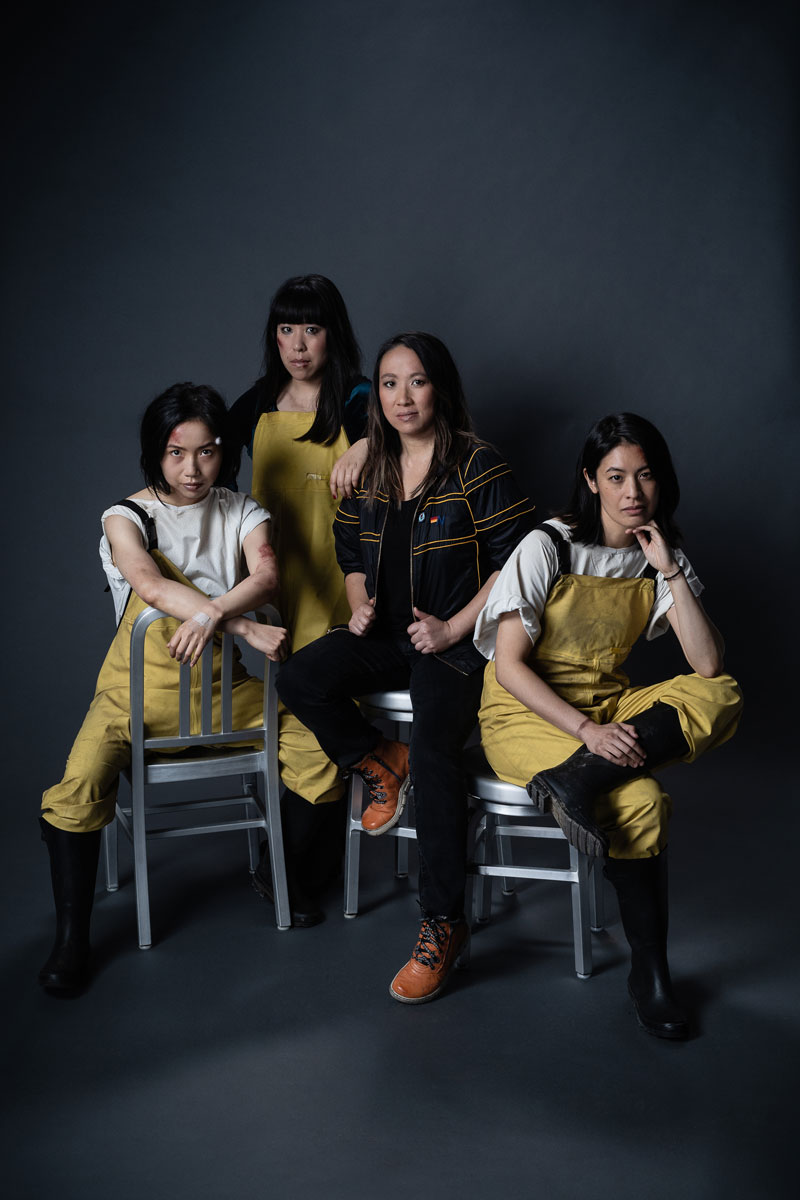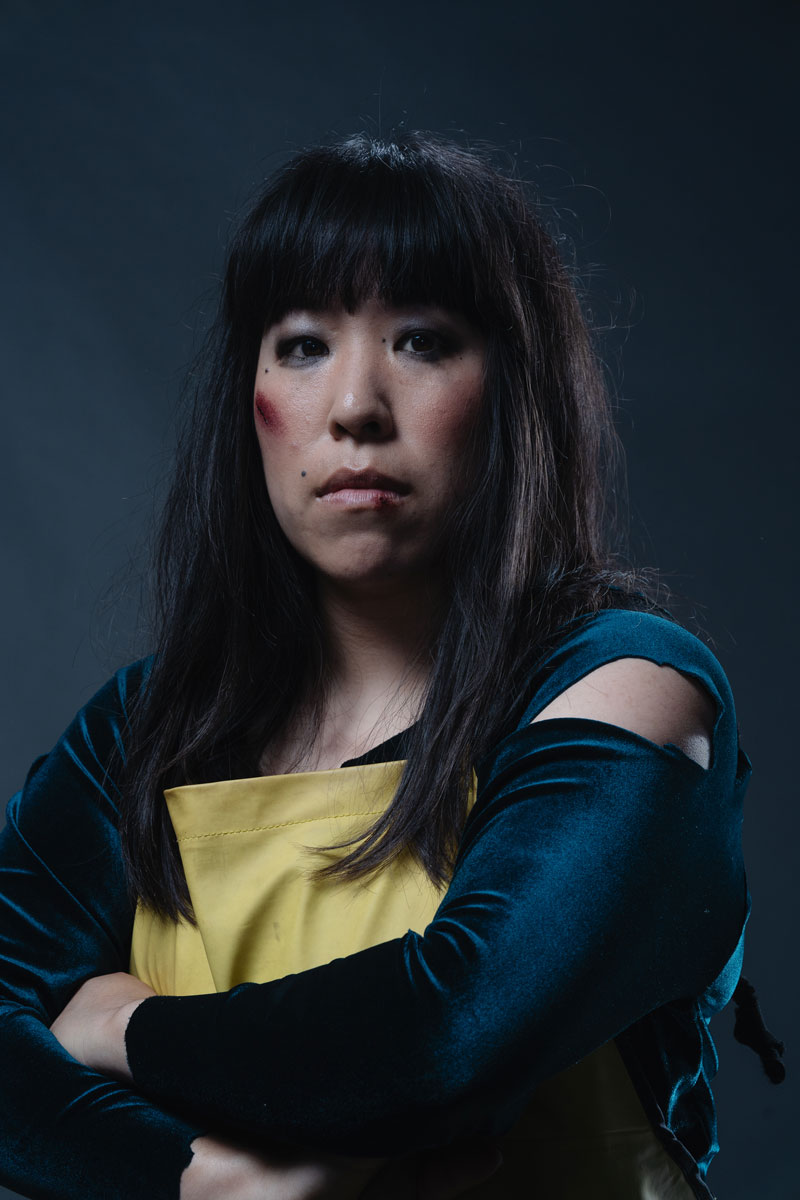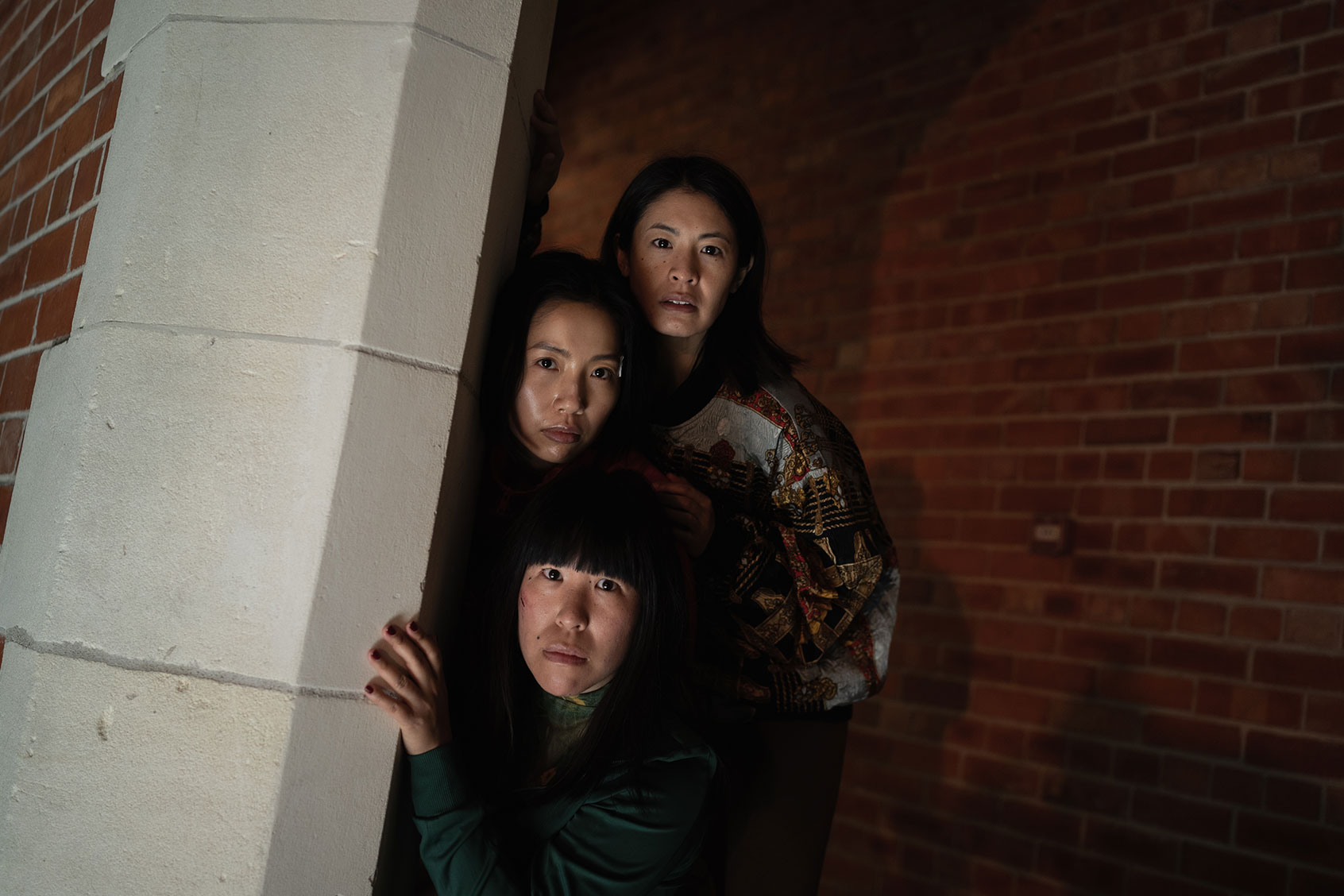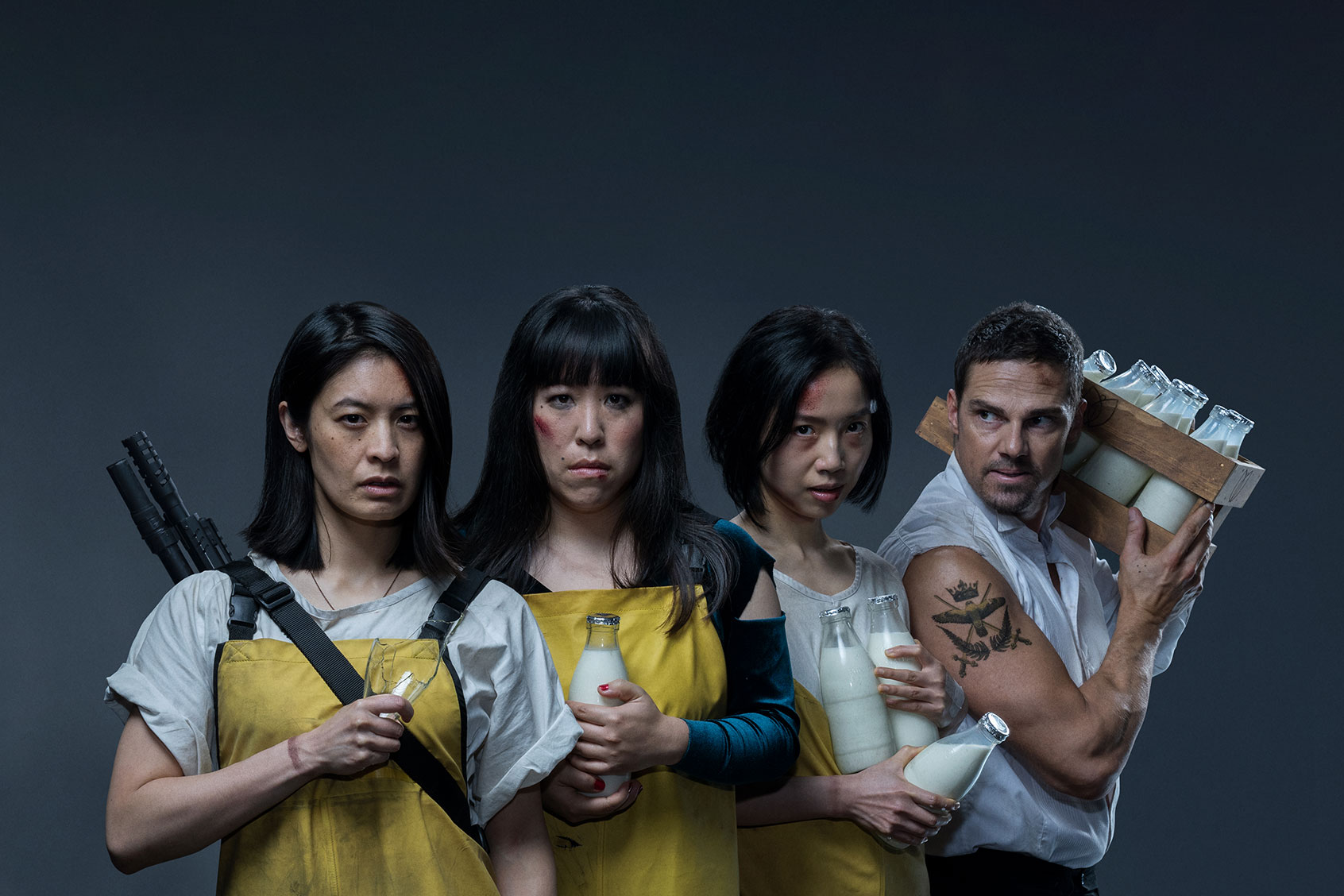Imagine a pandemic (well, I guess you don’t have to). Then, imagine that the virus only affects people with Y chromosomes, i.e. mostly men. How would the “mandemic” change the world? The thought experiment is the premise behind “Creamerie” (streaming on Hulu), a dystopian comedy drama created by and starring Perlina Lau, J.J. Fong, and Ally Xue and directed by Roseanne Liang. (“Creamerie” is locally funded New Zealand production with standard New Zealand acting contracts that are not subject to the SAG-AFTRA strike.)
Since its release in 2021, the series quickly garnered a cult following in New Zealand and Australia. The inception for the show came after Lau, Fong and Xue decided to take a break from the comedic web series, “Flat3,” which they had been working on together. During one of their routine catch-ups, they got to talking.
“I was watching ‘Handmaid’s Tale‘ — that was sort of the height of ‘Handmaid’s Tale,’ and Trump was in power. We sort of looked around and thought: it’s quite a grim world,” Lau told Salon. “We loved ‘Handmaid’s Tale.’ We’re very inspired by it. We thought: what if we could create a show like that but less depressing?”
“It’s scary to think that just because you won a certain right that doesn’t mean that it will stay.”
Thus, “Creamerie” was born. Set eight years after the mandemic, where men are essentially extinct and women rule the world, the series follows friends Pip (Lau), Jamie (Fong) and Alex (Xue) who run a dairy farm in the small town of Hiro Valley. Here, law and order is dictated by Wellness, a group that is essentially a girlboss’ wet dream. It’s run by cult leader Lane (Tandi Wright) who preaches the virtues of yoga, meditation and cheesy corporate slogans like “The future is female!” When the friends accidentally run over a man, Bobby (Jay Ryan), the crew learn that the virus hasn’t affected all men, and in fact, these men are on the run from a covert operation that “milks” them for their sperm — literally.
The show’s jokes and raunchy lines land even harder in today’s post-Roe America. While the creators are from and based in New Zealand where public health operates much differently, it was certainly on the mind for Lau when conceiving the show. “It’s scary to think that just because you won a certain right that doesn’t mean that it will stay,” continued Lau. To watch the show reverse the gender dynamics and reproductive rights is not just powerfully apt, but cathartic.
Check out the rest of Salon’s interview with Lau who breaks down the second season, Pip’s character and New Zealand humor.
The following interview has been lightly edited for length and clarity.
How did you approach creating Season 2?
A lot of Season 1 was spent trying to flesh out the characters and figure out who they all were, and we knew from the get go that we wanted to make them really different so that their motivations would be different and their agendas would be different. So for Season 2 that was already quite clear to us. The season is really about trying to get all the answers to the questions that they have. Each character is still on the same mission, but even more so. We’ve always had a three-season arc in mind. So the first season would be the rural community of Hiro Valley. The second season would be going to the city, so this season is about trying to figure out whether this is something that’s just contained to where they were living, or whether it’s something bigger.
 “Creamerie” creators Ally Xue, Perlina Lau, director/writer Roseanne Liang and J.J. Fong (Matt Klitscher/Flat3 Productions)Both Season 1 ends and Season 2 begins with Pip regretting her loyalty to Wellness because it jeopardizes her friends. What do you think the draw of this cult was for Pip? Should we sympathize with a cult’s followers?
“Creamerie” creators Ally Xue, Perlina Lau, director/writer Roseanne Liang and J.J. Fong (Matt Klitscher/Flat3 Productions)Both Season 1 ends and Season 2 begins with Pip regretting her loyalty to Wellness because it jeopardizes her friends. What do you think the draw of this cult was for Pip? Should we sympathize with a cult’s followers?
“In New Zealand, you just don’t see three Asians women being the leads of the show.”
Pip’s a very funny character, because I think there is a part of her that’s in all of us, but that’s blown up to be a huge part. I think that she thought, “Well, if I can get us in there it’s going to help me and Jamie and Alex. I’m doing this for us.” I think she likes to think she’s got the greater good in mind and at heart but she sort of just stuffs that up, keeps stuffing it up. So in Season 2 she’s very much in the dog box, and I think she’s realized what a mistake she’s made.
In the show, wellness is an instrument of oppression. Why was this an important aspect of the story?
We wanted to explore the idea, and particularly with Season 2, that power corrupts. And we just wanted to use the idea of wellness because that’s sort of been quite trendy. We thought, what if you had a beautiful villain, someone who actually looks really appealing, that the life they appear to lead is really nice, very calm and Zen and flip that around and actually use it as a weapon rather than for good. It’s sort of like a toxic positivity.
Even when she’s not trying and failing to gain the recognition of those in Wellness, she’s constantly being teased by Alex. Pip’s a bit of a social outsider with the exception of Jamie. Why do you think that is? How did you prepare to explore and develop her character?
I think ultimately Pip doesn’t really know herself. I think when you have a character like that or a person like that, it just means that they can be swayed quite easily, or rather they can be easily influenced. In terms of preparing for the character, it sort of reminded me of moments when I was younger, when you’re in school and you just don’t know who you are. You don’t know who your people are, you don’t know who you want to trust or be friends with. I think that I tapped into those memories. So it’s effectively that moment in my life or in our lives as an adult and turned into a character.
We need your help to stay independent
Would you say that’s her ultimate weakness then, not knowing who she is?
I don’t know if I call it a weakness. I think everyone is on a different timeline when it comes to knowing who you are. Some people figure it out really early on and other people figure it out later on. We always thought Pip was someone who probably worked as a middle manager and had aspirations of being in local politics. She sees herself as someone who can win the people over, she’s someone who can do the networking and that sort of stuff, but maybe she just didn’t quite land there before the pandemic hit. So then she kind of had to hunker down for eight years in this case. So those wants and needs are still there, but she hasn’t been able to exercise them.
What would you say her greatest strength is?
Perhaps her strength is also her weakness, that she does try to do the right thing. Even though it takes her a while to get there in the end, her heart is always in the right place. She still considers all avenues, even if she’s ended up choosing not quite the right thing. I think she does think about other people. She does want to try and do right by them.
“We absolutely stand in solidarity with the WGA and SAG-AFTRA.”
 Perlina Lau (Matt Klitscher/Flat3 Productions)Can we also take a moment to appreciate Pip’s bangs? It feels like such a central part of her character, like for instance in Season 1 when she is able to alert Jamie that Wellness is coming by telling her “I’m thinking of growing out my fringe.” How do you feel about the role the fringe plays in Pip’s character?
Perlina Lau (Matt Klitscher/Flat3 Productions)Can we also take a moment to appreciate Pip’s bangs? It feels like such a central part of her character, like for instance in Season 1 when she is able to alert Jamie that Wellness is coming by telling her “I’m thinking of growing out my fringe.” How do you feel about the role the fringe plays in Pip’s character?
The fringe is like the fifth core cast of the show. Maybe it should have its own IMDb page. I’ve had a fringe since I was like 20, so we thought I’ll just keep the haircut for the show. We loved the idea of a low-maintenance hair and makeup show. We thought if we do a show about a pandemic and it’s just women, we could all wear activewear and no makeup all day. Then it just became an “in” joke both in and outside of the show that I always had my perfect fringe. I think anyone who’s ever had bangs knows how high maintenance they are. I probably lost a year of my life just keeping it tidy.
Aside from Pip, her friends and her family, one can’t help but notice they are the only Asian characters in a sea of predominantly white women. What conversations went into this casting, and why was it important?
We’ve always been very conscious about casting. None of the characters in the show are just because or coincidental. We’ve thought about every character. We’ve got our three women at the center of the storyline, and in New Zealand, you just don’t see three Asians women being the leads of the show. Because three is quite a lot, so for three to occupy all main cast, plus Jay Ryan of course. On top of that, it’s comedy and drama — there’s just no other show like it. Both on and off screen, we want to make sure that there is diversity in the characters and the people being portrayed. For us, we always knew that we would have a white woman at the top, because in some ways that’s a comment on intersectionality, on gender politics and that if even if you do take men out of the picture or those with the Y chromosome, there are still inequities among women.
Unfortunately, Americans can relate to that lack of representation and inequity. While the show handles that it also balances gender dynamics, and it does so with a lot of humor. One of the funniest moments in Season 2 to me is when it’s revealed that the men that the resistance saved died because they wanted to play “IRL Call of Duty.” What kind of conversations went into creating that joke and the show’s depiction of men overall?
That was something we just thought was incredibly funny. A lot of what we do in terms of coming up with ideas is often you’re talking about an idea, you’re sort of swirling around on it, and actually, if you end up flipping it, what does that look like? Maybe you expect them to die in this very dramatic, huge, heroic way but actually, they just died in this really silly, nonsense way. We thought: what would it be like if there’s only a handful of you? Of course, you’re going to be coddled because you’re an asset in this world. So what happens to people when they get coddled, they become, not weak necessarily, but they don’t do anything. They’re just sort of hanging around.
In Season 2, we’re also introduced to Sea Captain, who is a trans man. How does this society deal with trans men and women? Were they spared from the mandemic?
So that’s played by Zoe Terakes, an amazing Australian actor and that was a real treat for us to have him on the show. But we’ve created a show where those with, well now we know not everyone, but those with Y chromosomes were wiped out. So trans men would still be in the world.
In the episode with the Sea Captain, he takes the crew to an underground black market, where Pip spends a while reading “Fifty Shades of Grey.” What inspired the inclusion of the book?
With that book, everyone can agree that that’s sort of the book of our generation. It landed and every person read it. But also, it has a lot of humor surrounding it, because it’s that damsel in distress kind of character. In some ways, it was a bit of a throwback to Season 1, because there’s the idea that you’re meant to hand in all that kind of material to stop you from being tempted or to remind you of men. It was also a fun moment to break a quite serious scene. I think for this season, Pip’s very much the comic relief in that regard. But I also think that if any of us saw that book or saw something that we weren’t allowed, you couldn’t help going up to it. And then, she stood there for too long.
So at the end of the season, it’s revealed that Jamie is pregnant with a baby boy and is treated much more reverently because of it. Despite saying that the future is female, Lane and her followers ironically worship this baby boy. What kind of conversations went into this reversal?
In this world getting pregnant is such a rare and wanted thing. I think that if you did have such a big event like this pandemic that wiped out half the population, firstly the world needs it, but also people still want to have children. I think that desire will still stay there. And in this world if you are pregnant with a boy as well, you’ve got the thing that people want or they don’t have and you could be potentially the key to continuing the population. With that comes a bit of power, like you said, reverence. It comes with respect. That’s something that these women in that group like Jamie haven’t had.
 “Creamerie” creators J.J. Fong, Ally Xue and Perlina Lau (Matt Klitscher/Flat3 Productions)“Creamerie” comes at a time where entertainment around women’s dystopia is on the rise, from “Handmaid’s Tale” to “Class of ’07” to “Yellowjackets.” How do you think “Creamerie” adds to or varies from this genre?
“Creamerie” creators J.J. Fong, Ally Xue and Perlina Lau (Matt Klitscher/Flat3 Productions)“Creamerie” comes at a time where entertainment around women’s dystopia is on the rise, from “Handmaid’s Tale” to “Class of ’07” to “Yellowjackets.” How do you think “Creamerie” adds to or varies from this genre?
We’ve always been inspired by a work that has a lot of leading ladies or stories about women, even going back all the way to “Sex and the City,” where you’ve got four female leads. We always knew hopefully whatever we made would add to that tapestry. But I suppose for this particular story, it combines both drama and New Zealand’s sense of humor, where you find the humor in the really silly, small, banal things. It’s a chance to show our country and our landscape.
Want a daily wrap-up of all the news and commentary Salon has to offer? Subscribe to our morning newsletter, Crash Course.
During this time, there is also currently a major strike happening in entertainment. I know that the show is a New Zealand production under that contract so you’re not subject to the SAG-AFTRA strike, but I was curious if you have any thoughts, maybe from a New Zealand perspective, about some of the things that they’re fighting for?
We absolutely stand in solidarity with the WGA and SAG-AFTRA. There’s such a pay gap and disparity between what the top execs are earning and what the performers and writers are earning. With the advent of AI, this is the chance to try and jump on top of it and negotiate and lock in what the future may look like for the next few years and ensure that these creatives get to keep doing their job and that it’s sustainable.
Lastly, I wanted to talk about Bobby because he seems to have a certain tension with Pip. Do you ship the two together?
We want to leave that up to the audience, because we want them to wonder whether it’s actually real or whether it’s happening in Pip’s head. Because I suppose she’s quite naive. She’s quite young in that sense. When you are younger, you have these crushes that actually nothing ever comes of it. We wanted to treat it that way and let the audience decide what they make of that relationship. And also not every show has to have a romantic relationship. We leave it up to the viewers to decide.
Both seasons of “Creamerie” are now streaming on Hulu stateside, on TVNZ+ in New Zealand and coming to SBS On Demand and SBS VICELAND in Australia on Aug. 28.
Read more
about dystopian TV shows

